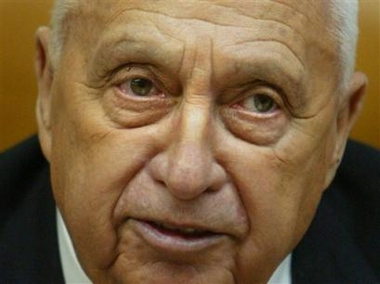|
Israeli PM to transfer power during surgery
(AP)
Updated: 2006-01-04 09:17
Israeli Prime Minister Ariel Sharon will hand over power to his deputy during
a heart procedure this week, his office said Tuesday, the first time an Israeli
leader has agreed to give up his authority because of illness.
Sharon's office played down concerns about the 77-year-old leader's health,
saying the procedure to close a small hole in his heart, including a period when
he will be under general anesthesia, will last only three hours. However,
officials canceled Sunday's weekly Cabinet meeting to give Sharon an extra day
to recover.
Vice Premier Ehud Olmert will take over during the procedure, Sharon's office
said.
Doctors discovered the hole after Sharon suffered a mild stroke Dec. 18. The
hole, measuring about one-eighth of an inch, apparently led to the stroke by
allowing a small blood clot to reach Sharon's brain.

Israeli Prime Minister Ariel Sharon speaks
during the weekly cabinet meeting at his Jerusalem office, Sunday Jan.1,
2006. [AP] | Although Sharon temporarily lost the
ability to speak, his doctors said the prime minister suffered no lasting
damage. He already has resumed his full work load, and doctors say Thursday's
procedure, called a heart catheterization, will virtually eliminate the risk of
a similar stroke.
Using a catheter inserted through a blood vessel in Sharon's groin, a team of
cardiologists will put an umbrella-like device over the hole to seal it. A small
camera inserted through Sharon's throat will guide the doctors.
"After the catheter is taken out, the two parts of the umbrella stick to one
another and close the hole," said Ron Krumer, a spokesman for Hadassah
University Hospital in Jerusalem, where Sharon will undergo the procedure.
Sharon was treated for his stroke at the same hospital.
Over time, the umbrella becomes part of the heart wall, Krumer said.
Sharon is expected to be released from the hospital on Friday, he added.
Dr. Jonathan Marmur, head of interventional cardiology at SUNY Downstate
Medical Center in New York, said the procedure is "state of the art and cutting
edge."
"The prognosis is excellent. For the most part, experience with these devices
has been excellent. There's a low complication rate, high success rate and low
stroke rate after implantation," he said.
Possible complications include the device moving from its intended position
and slipping into the heart or bloodstream, or the device could erode or
potentially perforate the heart, Dr. Marmur said. But he said the chance of
either complication is "very small."
The procedure is generally not considered to be surgical since it does not
involve major incisions or stitches.
Israeli Cabinet Secretary Yisrael Maimon said the procedure is expected to
last three hours, though Sharon will be unconscious for no more than an hour.
After consultations with Maimon and Israel's attorney general, Sharon agreed
to transfer his authority to Olmert during that time.
"Since we are talking about three hours, I do not see this as a big drama,"
Maimon said. He said Sunday's Cabinet meeting was canceled to give Sharon more
time to rest. "God willing, he will back at work on Monday," he said.
Olmert, a close confidant of Sharon, declined comment.
The process of transferring power is spelled out in a 1992 law. But Thursday
will mark the first time in Israel's 57-year history that a leader has yielded
his authority because of an illness, said legal commentator Moshe Negbi. In
previous cases, including lengthy illnesses suffered by Golda Meir in the 1970s
and Menachem Begin in the 1980s, their ailments were hidden from the public.
"This is unprecedented," Hanegbi said. He said the brief turnover is
significant, given the constant state of crisis in a country that can experience
suicide bombings and rocket attacks at any moment.
"I think Israel cannot afford not to have someone in charge, even for one
minute," he said.
Last month's stroke has put the health of Sharon, who turns 78 next month, on
the political agenda as he seeks a third term in March 28 elections.
Sharon recently quit the hard-line Likud Party to head a new centrist party
in the upcoming election. The new party, Kadima, is centered on Sharon, who is
the country's most popular politician. Sharon says leaving Likud will give him
more leeway to pursue a peace deal with the Palestinians.
The health scare appears to have had no effect on the party's prospects.
Opinion polls forecast a strong victory for Kadima, putting Sharon in a position
to form a ruling coalition. Polls show Likud far behind.
Benjamin Netanyahu, a former prime minister elected to lead Likud last month,
said Tuesday that he would not make an issue out of Sharon's health during the
campaign.
|